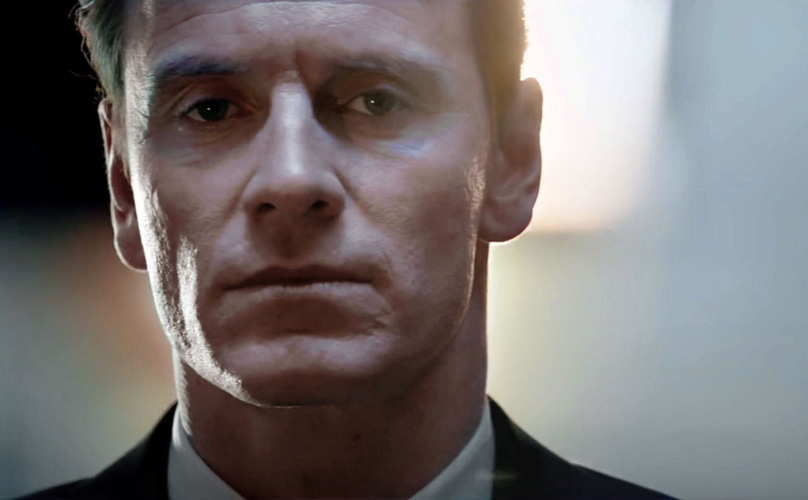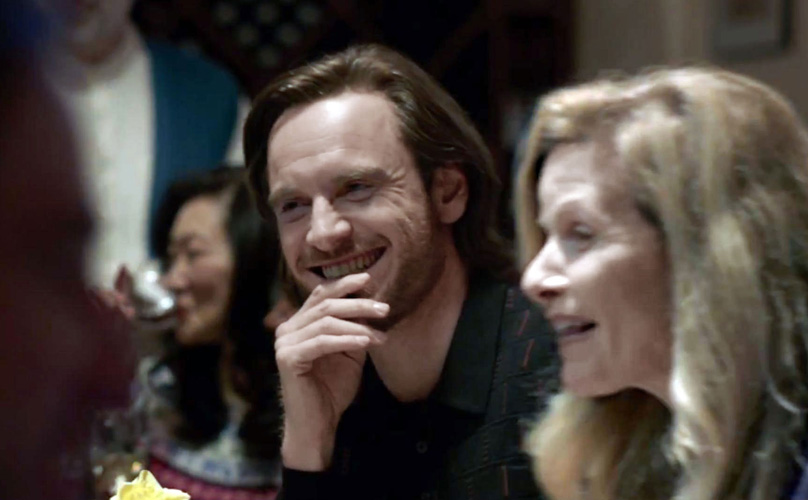
|

|

|

|

|

|

|

|

|

|

|

|


How do you get to the bottom of a character like Steve Jobs, a figure so towering and complex that he could arguably serve as the basis of a film as ambitious as Citizen Kane? If you're a dramatist with the character insight and verbal dexterity of Aaron Sorkin, you make him the vortex of a swirling human hurricane, the puppet master who kept all around him on strings, the impresario of a circus dedicated to the creation and dramatic unveiling of technological wonders that changed the world. Racing in high gear from start to finish, Danny Boyle’s electric direction temperamentally complements Sorkin's highly theatrical three-act study, which might one day be fascinating to experience in a staged setting. With its high-profile launches at the Telluride, New York and London film festivals, this Universal release is clearly positioned as one of the prestige titles of the fall season, and will be high priority viewing for discerning audiences around the world.
Conceptually, Sorkin's work is structured like a play, as the three roughly forty-minute sections are set backstage as Jobs, who has been invested with equal parts hubris and focus by Michael Fassbender, prepares to launch three of his major products: The Macintosh in 1984, the NeXT "Cube" in 1988 and the iMac in 1998. The same subsidiary characters swirl in and out: Jobs' feisty and invaluable marketing executive Joanna Hoffman (Kate Winslet), tech genius and early partner Steve Wozniak (Seth Rogen), Mac software designer Andy Herzfeld (Michael Stuhlbarg), Apple chief executive John Sculley (Jeff Daniels), perennially shunned ex-girlfriend Chrisann Brennan (Katherine Waterston) and the latter’s daughter with Jobs, Lisa (Makenzie Moss, then Perla Haney-Jardine). The actors are uniformly superb.
The dramatic, dynamic linking all these characters is that everyone wants something from the young Zeus of their world that they cannot get. The specifics differ in each case, but they all boil down to the desire for acknowledgment of their value from a difficult and withholding man, one famous for abusing his underlings, keeping them guessing about where they stand and rejecting their ideas only to later claim them as his own. As with Kirk Douglas' ambitious movie producer in The Bad and the Beautiful in another era, the boss treats even those closest to him very badly but, in the end, his intimates and associates so desperately crave his approval that they keep coming back for more.
Following a disarming black-and-white clip of Arthur C. Clarke in 1974, accurately extolling a future in which computers will "enrich our society" and be as commonplace as telephones, Boyle and Sorkin jump ahead just ten years and plunge right into the mad moments before Jobs is to take the stage in Cupertino to introduce the Mac to a panting public, which has already had its appetite whetted by Ridley Scott's brilliant 1984 Super Bowl commercial.
Jobs (who was just 29 at the time) was never anything other than cool and composed before the public, but conditions backstage could not be more chaotic: Jobs insists to his frazzled tech wizard Hertzfeld that the Mac itself must say "hello" to the crowd and demands that the exit signs be (illegally) turned off, Woz badgers him to publicly acknowledge the old Apple II team and Chrisann picks this moment to show up with little Lisa and give him hell for not acknowledging his daughter and providing for them.
To a man who insists that the day's event is equal in importance to the winning of World War II and repeatedly compares himself to God, the entreaties of his underlings seem like so much begging. It must be accepted by everyone in his sphere that Jobs operates on an immeasurably higher level than they do and that his will must be done. Although he can, however infrequently, bend and compromise, people mostly go along for fear of being cast out of his orbit altogether.
While the presence of Jobs' ex and child at a moment like this seems pretty unrealistic, even forced, Sorkin's dramatic strategy becomes clear: He's using a compressed moment of career intensity to spotlight diverse elements of his subject's nature—overweening ambition, massive self-confidence, ultra-demanding posture, lack of compassion and overriding egomania—for the purposes of illuminating his genius as well as his paranoia about others. "I'm like Julius Caesar," he insists to Sculley. "I'm surrounded by enemies."
As he has repeatedly shown in the past, Sorkin has a gift for writing the elevated gab of brainiacs, which has made him an ideal chronicler of such modern-age titans as Mark Zuckerberg and now Jobs. That said, The Social Network and Steve Jobs are radically different in their approaches to drama and character. But whereas David Fincher's direction of the former provided an incisive, and often quite funny, sense of cool to the former, Boyle's fast-heartbeat pacing and quasi-verite style provides the new film with a constant dramatic hum and you-are-there immediacy.
Four years later, Jobs' suspicions have been confirmed by his exile from Apple. The grand old San Francisco Opera House is the setting for the next presentation, of the gorgeously geometric but universally undesired NeXT computer. Indeed, the portent of failure looms over this attempt at reinvention like a fog bank rolling in over San Francisco, and years of mounting conflict come to a head as Jobs and Apple separately hit bottom.
By 1998, however, Jobs is back in charge overseeing the launch of the iMac. Although Woz persists in goading his old friend about how the Apple II is still the only successful Apple product, Joanna (the only person in this telling who can sort of stand up to Jobs) assures him that, this time, "You're gonna win."
After the downer dynamics of the second act, Boyle whips up a real sense of enormous expectations in the home stretch, a feeling that the revolution has arrived due to one man's unswerving foresight, drive and perfectionism. Jobs may have treated many people badly and never built anything himself, but what mattered was his vision and refusal to be deterred. It's a description that fits many, if not most, great and influential figures in history, and it certainly does here.
Still, Steve Jobs might have been a too remote, too documentary-like film if it weren't for the element of his daughter Lisa. This part of Jobs' story is painful in human terms, with the child of one of the nation's richest men obliged to live, along with her mother, on a pittance in squalid surroundings; getting anything out of him, be it love or money, provokes legitimate comparisons to Scrooge. But as Lisa grows older, there is a bit of understanding on her part and a degree of grudging generosity from him, providing the film with its bit of heart.
Propulsively fast, fleet and inquisitive, the film is at the same time somewhat less flashy than most of Boyle's most famous and successful works, including Trainspotting, Slumdog Millionaire and 127 Hours. Due to its "backstage" setting and approximate real-time frame, Jobs can't help but provoke memories of the recent Birdman, which breathtakingly covered continuous action with unprecedented fluidity. Boyle's sophisticated but pragmatic visual approach to evoking a maelstrom of activity stands somewhere between that and more conventional cinema-verite, befitting, perhaps, the period in which it's set.

But hardly any of this would matter without a dynamic actor at the center of things nailing the part of Jobs, and while Fassbender doesn't closely physically resemble the man, he fully delivers the essentials of how we have come to perceive the man: Along with intellectual brilliance and force of personality, the actor also taps into the man's frequently unreachability, power to inspire, unswerving faith in his own instincts, attention to the smallest detail, utter lack of sentimentality and the certitude that can come from occupying a different, loftier realm. Most of all, you get the strong sense from Fassbender of a mind that is always several steps beyond everyone else's, one that allows him to shift gears without taking a breath.
The three women in Jobs' life portrayed here get just enough screen time for the actresses playing them — Winslet, Waterston and Haney-Jardine as the adolescent Lisa — to bust out with long-supressed emotion. Albeit with great difficulty, they, at least, get the man to bend slightly, which is more than his male associate can say.
Works about Jobs have become something of an industry in the four years since his death. There have already been two number-one best-selling biographies, by Walter Isaacson in 2011 and the current Becoming Steve Jobs by Brent Schlender and Rick Tetzeli. This is the second posthumous dramatic film, after Joshua Michael Stern's lackluster Jobs in 2013, with Ashton Kutcher in the title role (there was also the 1997 cult favorite TV film Pirates of Silicon Valley). Documentaries are proliferating, from Steve Jobs: One Last Thing in 2011 to the indefatigable Alex Gibney's current Steve Jobs: The Man in the Machine. And in 2017, there will be an opera. There may never be the last word.
